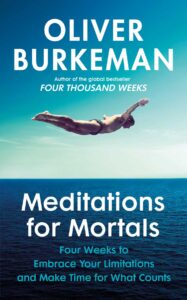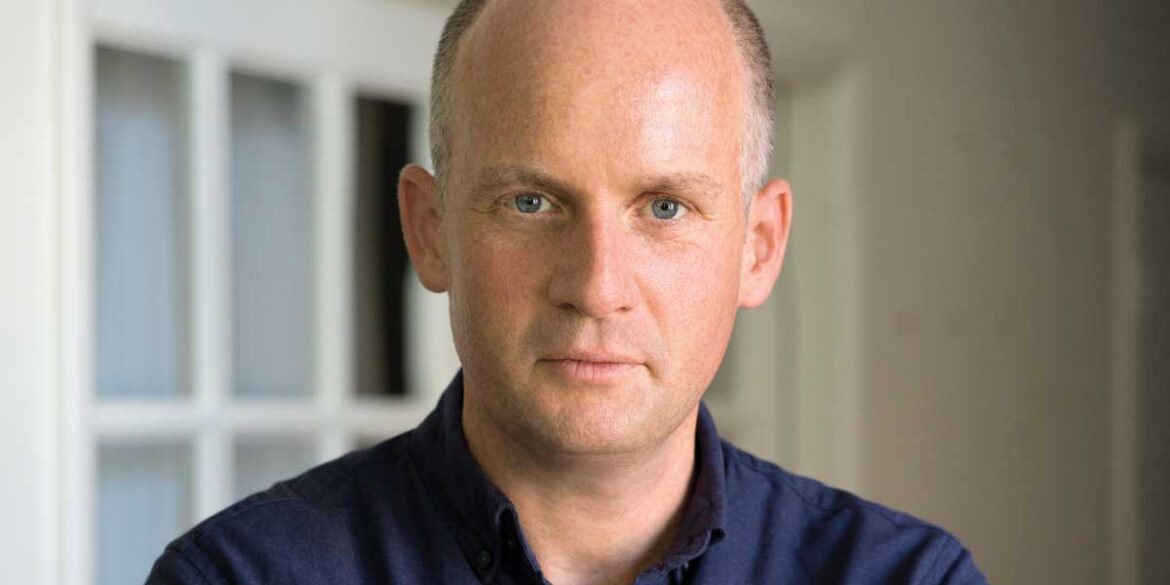Described as a ‘four-week retreat of the mind’, we speak with best-selling author Oliver Burkeman about his new book, Meditations for Mortals, ahead of his talk at the University Arms Hotel on 17 September
Words Phoebe Harper Portrait Nina Subin
For Oliver Burkeman, the genesis of his latest book – Meditations for Mortals, Four Weeks to Embrace your Limitations and Make Time for What Counts – came from the all-too-familiar feeling of reading plenty of material about how to lead a more productive life, but then spending years trying to actually put those systems into practice. “I found that, in almost all cases, these books just encouraged my perfectionistic tendencies towards trying to get everything done, which just leads to more busyness and procrastination. Or that they subtly led me to believe that the really meaningful part of life would begin when I finally ‘got on top of everything’.”
So, in the face of these ever-shifting goalposts, he decided to write a book about actually getting around to the meaningful things in life: “here and now, in our limited and imperfect lives.”
Sign of the times
Many know Oliver as the internationally best-selling author of Four Thousand Weeks: Time Management for Mortals – an essential guide and probing look at our perception of time and how we can abuse it during our limited lifespans. Rather like Four Thousand Weeks, this newest work of nonfiction is very much the result of the age we live in – a book for modern times, made for modern readers.
 “I think we’re living through especially volatile, anxiety-inducing and distracting times, which exacerbate the challenge of building a meaningful life in two ways,” he observes. “Firstly, many of us feel we ought to be doing more about the climate crisis, threats to democracy – and so on. So we’ve got those items on the to-do list, as well as all the others. Secondly, the distracting nature of the news just makes it harder to get around to anything because you’re worrying or doomscrolling instead.”
“I think we’re living through especially volatile, anxiety-inducing and distracting times, which exacerbate the challenge of building a meaningful life in two ways,” he observes. “Firstly, many of us feel we ought to be doing more about the climate crisis, threats to democracy – and so on. So we’ve got those items on the to-do list, as well as all the others. Secondly, the distracting nature of the news just makes it harder to get around to anything because you’re worrying or doomscrolling instead.”
As such, a key message within the book is that, for limited humans with finite time, it makes no sense to wait until things calm down. “You have to take action – and also make time to have fun, which is no less important – right here in the midst of the chaos and the uncertainty.”
To aid this, the book’s structure deliberately reflects the need to take action over the course of four weeks. “It’s intended to spur action during the time you’re actually reading it – instead of offering a system you might implement one day when you get a spare moment,” he says. Because, if there’s one thing we all know about modern life, it’s that a spare moment can be a rare and elusive thing.
A journey of learning
In the process of writing, Oliver comments how this was equally a time of learning for him, as much as it might be for a reader first encountering the book. “Every book is at least partly an exercise in grappling with whatever I’m struggling with the most,” he observes. “I’ve written before about the broader issue of our finite time and limitations, but here I was struck to discover how many of my own struggles in this area are tangled up with issues of self-worth – in other words, the way we feel we aren’t justifying our existence on the planet unless we do more, achieve more and stay on top of more demands. The great irony is that real, meaningful productivity arrives more easily when you realise that you don’t need to get more and more stuff done in order to justify your existence.”
In terms of what readers can take away from the book, Oliver hopes they feel a sense of liberation and relaxation. With this comes a new ability to exhale, which hopefully translates into a new energy for getting around to what matters to them.
“In that sense, it’s not a ‘motivational’ book; I’m not trying to suggest you need a shove in order to get moving. Instead, I think that when we let go of some of the mistakes and illusions that inhibit us, action tends to flow much more naturally.” Besides, we’re only human after all.
Cambridge Literary Festival @ University Arms
On 17 September, CLF returns to the University Arms for an evening of literary conversations. Elif Shafak and Rob Macfarlane will discuss There Are Rivers in the Sky, while Oliver Burkeman will talk to Catherine Carr about Meditations for Mortals. Buy tickets to both events to receive a 25% discount.
Book tickets online at cambridgeliteraryfestival.com

